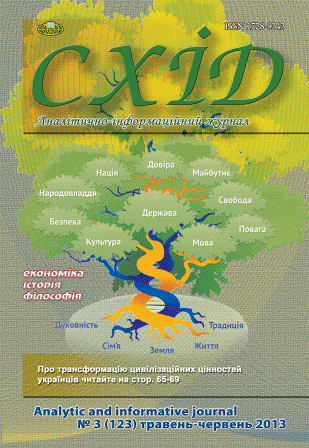Anthropomystical line in the history of Ukrainian philosophy
DOI:
https://doi.org/10.21847/1728-9343.2013.3(123).15359Keywords:
anthropomysticism, paradigm, Ukrainian philosophy, the psychoexistential, mysticism, mystical realism, mentalityAbstract
The article examines essential determinants which influenced the history of becoming of anthropomystical paradigm in Ukrainian philosophy. Anthropomysticism is defined as anthropological doctrine based on mystical ontological background which maintains actual possibilities of transcendence as a mode of human existence. There exist two basic anthropomystical paradigms - substantial one and energetical one, they are attributive for any systemic form of social consciousness. Ukrainian mentality is proved to synthesize the elements of both paradigms. Ukrainian folklore, religious doctrines and philosophical issues correlate with ontological framework of mystical realism which posits human existence as holonomic to Being (Nature). Forms of mystical realism are subjected to the strategy of historical reconstruction of evolution of Ukrainian mentality. Rational reconstruction of anthropomystical categories is meant to enrich the post-nonclassical conceptualization of phenomena of mystical consciousness. Anthropomysticism as a psychoexistential paradigm of mystical philosophy proved to be an authentic component of Ukrainian mentality as far as the elements of anthropomysticism can be found at every stage of its evolution and on every stratum of its structure (myth, poetics, casual thinking, philosophy). Prevalence of existential cultural forms over rationalist conceptuality is proved to be characteristic for Ukrainian philosophy.
Downloads
References
Гнатенко П. І. Український національний характер / П.І.Гнатенко. - К. : ДОК-К, 1997. - 116 с.
Евлампиев И. И. История русской метафизики в XIX - XX веках. Русская философия в поисках абсолюта. Часть І / И. И. Евлампиев. - СПб. : Алетейя, 2000. - 415 с.
Зеньковский В. В. История русской философии / В.В.Зеньковский. - Харьков : Фолио ; М. : ЭКСМО-Пресс, 2001. - 896 с.
Нечуй-Левицький І. Світогляд українського народу (Ескіз української міфології) / І. Нечуй-Левицький. - К. : АТ "Обереги", 1992. - 88 с.
Проблеми теорії ментальності / [відповід. ред. М. В. Попович]. - К. : Наук. думка, 2006. - 404 с.
Трубецкой С. Н. Сочинения / С. Н. Трубецкой ; [сост., ред. и вступ. статья П. П. Гайденко, примеч. П. П. Гайденко, Д. Е. Афиногенова]. - М. : Мысль, 1994. - 816 с.
Конотоп Л.Г. Головні характеристики містики: структура і зміст (в контексті релігійної антропології) / Конотоп Л.Г., Хромець В.Л. // Антропологічні виміри езотеричної філософії (компаративістський аналіз). - Слов'янськ : Печатный двор, 2005. - C. 67-100.
Hnatenko P. I. (1997), Ukrainian national character, DOK-K, Kyiv, 116 p. (ukr).
Evlampiev I. I. (2000), History of Russian metaphysics in the 19th and 20th centuries. Russian philosophy search for the Absolute, Part І, Aletheia, Saint Petersburg, 415 p. (rus).
Zenkovskiy V. V. (2001), History of Russian philosophy, Folio, Kharkov, EKSMO-Press, Moscow, 896 p. (rus).
Nechui-Levytskyi I. (1992), The worldview of Ukrainian people (Short treatise on Ukrainian mythology), Kyiv, 88 p (ukr).
Popovich M. V. (2006), Problems of the theory of mentality Kyiv, Naukova Dumka, 404 p. (ukr).
Trubeckoy S. N. (1994), Selected works, Mysl, Moscow, 816 p. (rus).
Konotop L.H., Khromets V.L. (2005), Main descriptions of mysticism : structure and maintenance (in the context of religious anthropology) in: Anthropological measuring of esoteric philosophy (comparativist analysis), Pechatnyi dvor, Sloviansk, p. 67-100. (ukr).
Downloads
Published
How to Cite
Issue
Section
License
Copyright (c) 2013 Leonid Mozghovyi

This work is licensed under a Creative Commons Attribution-NonCommercial-NoDerivatives 4.0 International License.
1. Authors bear responsibility for the accuracy of facts, quotations, numbers and names used.
2. Manuscripts are not sent back.
3. The publisher does not always agree with the authors' opinion.
4. The authors reserve the right to authorship of the work and pass the first publication right of this work to the journal under the terms of a Creative Commons Attribution-NonCommercial-NoDerivatives 4.0 International License. This license allows others to distribute (copy) the published work for non-commercial purposes, provided there is mandatory attribution to its authors and a link to the first publication in our journal.
5. The authors have the right to conclude separate supplement agreements that relate to non-exclusive work distribution in the form in which it has been published by the journal (for example, to upload the work to the online storage of the journal or publish it as part of a monograph), provided that the reference to the first publication of the work in this journal is included.

